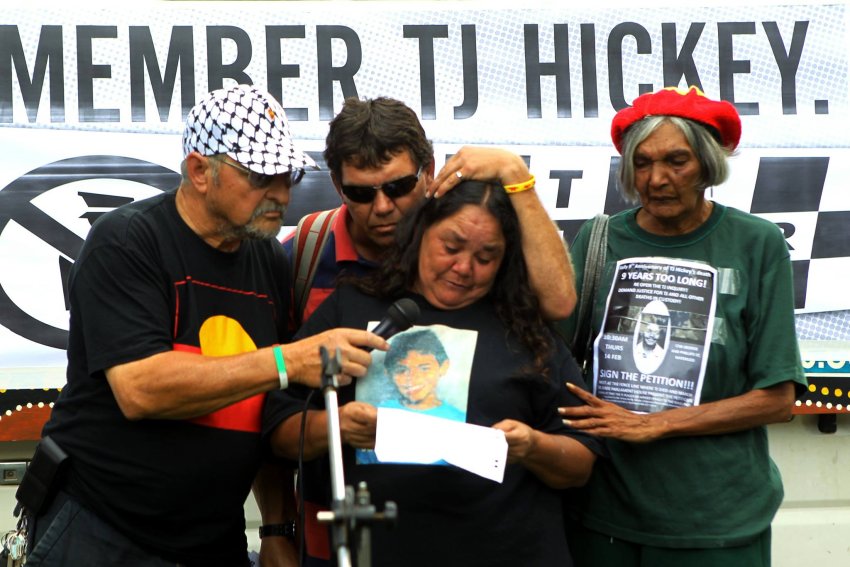
February 14 marks 18 years since young Kamilaroi man TJ Hickey died after being chased by police and landing heavily on a fence. No one has been charged; his family is yet to receive any justice. TJ was just 17 years old.
TJ was riding his bike in Redfern when a New South Wales Police car, driven by then-Constable Michael Hollingsworth, collided with him, catapulting him onto a fence. Contrary to police protocols, TJ was pulled off the fence and taken to Prince of Wales Hospital where he died the next day.
The NSW Coroner allowed Hollingsworth to not testify during the inquest, on the basis that he might incriminate himself. The Hickey family, led by TJ’s mother Gail, has been fighting for justice ever since.
The Hickey family’s tragedy is not uncommon. There have been more than 500 First Nations deaths in custody since the 1991 Royal Commission into Aboriginal Deaths in Custody. Last year, at least 15 First Nations people died in custody.
NSW Police are infamous for their harassment, including strip searching, of First Nations children and youths in the streets. But this is not confined to one state: police across the country harass and over-police First Nations communities — and are mostly supported by the legal and policing systems.
The only police officer to be charged with murder — that of 19-year-old Warlpiri man Kumanjayi Walker in 2019 in Yuendumu, Northern Territory — is currently fighting his conviction in the NT Supreme Court.
So many lives could have been saved but governments refuse to enact the 339 recommendations of the Royal Commission into Aboriginal Deaths in Custody, that were aimed at keeping people out of the prison system.
Meanwhile, the rate at which First Nations people are imprisoned continues to grow. Children as young as 10 are being arrested for minor misdemeanors and thrown into jails, such as the Don Dale Youth Detention Centre in the Northern Territory. The 2016–17 Royal Commission into the Protection and Detention of Children in the NT said Don Dale must be closed and that the age of criminal responsibility should be raised to at least 14 years. Neither has happened.
These facts lay bare the systemic racism.
The sustained Black Lives Matter protests following the police murder of George Floyd in the United States drew attention to First Nations deaths in custody at the hands of police in this country.
Floyd’s cry, “I can’t breathe”, as Minneapolis police officer Derek Chauvin pressed his knee into the back of his neck mirrored the death in custody of David Dungay Jr, who said the same when officers held him down while injecting him with a sedative in Long Bay Jail in 2015.
Australia is built on genocidal colonial oppression and dispossession of First Nations peoples, Indigenous deaths in custody is just one aspect of this.
This year marks the longest running protest for Indigenous rights in this country — the 50th anniversary of the Aboriginal Tent Embassy. Gumbainggir activist and historian Gary Foley told Green Left that the protesters “saw self-determination as the ultimate objective … we hoped land rights would lead us towards some degree of political and economic independence.”
The Aboriginal Land Rights Act became law in NSW in 1983, but of more than 53,000 claims, only 3450 have been granted. Chairperson of the NSW Aboriginal Land Council Danny Chapman wrote in the Sydney Morning Herald on January 26 that 72% of claims are still outstanding and that the campaign “for meaningful land rights” continues.
Racism is also behind the ability of corporations to destroy culture, language and knowledge, including Rio Tinto’s destruction of the 46,000 year old Juukan Gorge heritage site, gas giant Santos’ fracking plans in the Beetaloo Basin in NT and Woodside’s push to develop the Scarborough gas field exploitation project in Murujuga (Burrup Pensinsula).
Before colonisation in 1788, more than 300 languages were spoken across the continent and surrounding islands. Aboriginal and Torres Strait Islander nations had established social, political and economic structures, engaged in trade and sustainably managed the fragile ecosystems.
The process of colonisation and dispossession has included inter-generational trauma, enslavement, genocide, assimilation, and loss of language, culture and identity.
One bright spot, however, is that young people in their tens of thousands keep taking to the streets on Invasion Day on January 26. They know that real justice for TJ, David Dungay Jr, Kumanjayi Walker, and all those who have been killed in custody, has to be fought for.